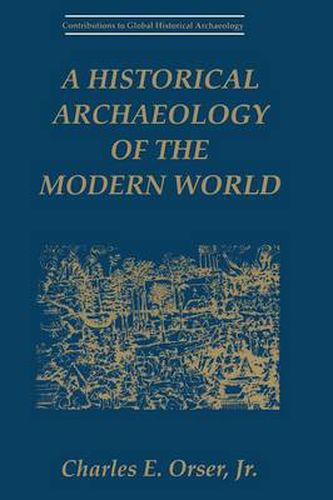Readings Newsletter
Become a Readings Member to make your shopping experience even easier.
Sign in or sign up for free!
You’re not far away from qualifying for FREE standard shipping within Australia
You’ve qualified for FREE standard shipping within Australia
The cart is loading…






This title is printed to order. This book may have been self-published. If so, we cannot guarantee the quality of the content. In the main most books will have gone through the editing process however some may not. We therefore suggest that you be aware of this before ordering this book. If in doubt check either the author or publisher’s details as we are unable to accept any returns unless they are faulty. Please contact us if you have any questions.
This unique book offers a theoretical framework for historical archaeology that explicitly relies on network theory. Charles E. Orser, Jr., demonstrates the need to examine the impact of colonialism, Eurocentrism, capitalism, and modernity on all archaeological sites inhabited after 1492 and shows how these large-scale forces create a link among all the sites. Orser investigates the connections between a seventeenth-century runaway slave kingdom in Palmares, Brazil and an early nineteenth-century peasant village in central Ireland. Studying artifacts, landscapes, and social inequalities in these two vastly different cultures, the author explores how the archaeology of fugitive Brazilian slaves and poor Irish farmers illustrates his theoretical concepts. His research underscores how network theory is largely unknown in historical archaeology and how few historical archaeologists apply a global perspective in their studies. A Historical Archaeology of the Modern World features data and illustrations from two previously unknown sites and includes such intriguing findings as the provenance of ancient Brazilian smoking pipes that will be new to historical archaeologists.
$9.00 standard shipping within Australia
FREE standard shipping within Australia for orders over $100.00
Express & International shipping calculated at checkout
This title is printed to order. This book may have been self-published. If so, we cannot guarantee the quality of the content. In the main most books will have gone through the editing process however some may not. We therefore suggest that you be aware of this before ordering this book. If in doubt check either the author or publisher’s details as we are unable to accept any returns unless they are faulty. Please contact us if you have any questions.
This unique book offers a theoretical framework for historical archaeology that explicitly relies on network theory. Charles E. Orser, Jr., demonstrates the need to examine the impact of colonialism, Eurocentrism, capitalism, and modernity on all archaeological sites inhabited after 1492 and shows how these large-scale forces create a link among all the sites. Orser investigates the connections between a seventeenth-century runaway slave kingdom in Palmares, Brazil and an early nineteenth-century peasant village in central Ireland. Studying artifacts, landscapes, and social inequalities in these two vastly different cultures, the author explores how the archaeology of fugitive Brazilian slaves and poor Irish farmers illustrates his theoretical concepts. His research underscores how network theory is largely unknown in historical archaeology and how few historical archaeologists apply a global perspective in their studies. A Historical Archaeology of the Modern World features data and illustrations from two previously unknown sites and includes such intriguing findings as the provenance of ancient Brazilian smoking pipes that will be new to historical archaeologists.